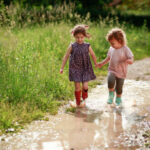At the age of 30, I had a psychotic mania that was very difficult for me. When my friends were starting to have a family, I inherited a mental illness. I could not help but compare myself to them, to what they had and that I did not have. I then started to distance myself from my friends and wanted to be with people that were living the same thing as me. .
People that live the same thing as me
During this episode, my case manager presented H to me, a brilliant student doing a doctorate in Engineering at ETS. She had just had a psychotic depression. We were living similar challenges, like the shock of being followed in psychiatry or the effects of psychotropic medications. We had made it a habit to meet at Cha noir, a stylish tea room on Wellington Street in Verdun. We would discuss of mental health, of our social network and also of projects and occupations. Then H had two children and succeeded obtaining a job in engineering. During this period, I had the misfortune of doing other episodes, which made me distance myself from H. Only recently I got back in touch with H, with whom I occasionally have coffee with.
Following another bipolar episode, I was living with anxiety, particularly social anxiety. A worker from the crisis center l’autre maison then suggested I integrate a support group at the CLSC with the organization Phobies-zéro. One day, at the end of a session, a participant J, her too with bipolar disorder, approached me and asked for my telephone number. It was the beginning of our friendship. J is a friend to whom I could tell everything, nothing is taboo. We have a lot of discussions regarding our mental health and our situation as childless women. At a certain point in time, we wanted to do a project together (offer online training on the experience of a psychosis) but in the end we did not realize our idea. With J, I liked to organize suppers, go to cafés, go for walks, go to the market, go swimming, etc. When I had the last episode of mania, I suddenly stopped seeing her, later on we got in touch again.

When I recovered, there was a period when I was not working and where I created a personal blog on mental health. Li, a user of mental health services, started to get interested in my articles and that is how we started communicating online. So, we decided to meet and do small outings like going to the restaurant. With Li, I can discuss with no taboo about mental health and even details concerning psychosis and the symptoms. We would help each other and morally support each other facing challenges and difficulties that we encountered. We would also discuss about ways that would facilitate our recovery.
Since I started working at Groupe Innova, I had the opportunity to meet S, my colleague in the office, that also lives with a mental health disorder. As time goes by, we have developed a rapport and we are aware of our respective personal lives. The office environment allows us to support each other with what we live outside work. For some time, we have a routine to eat at a restaurant every Thursday. It creates stability in our routine, an important element to preserve a psychic stability.
Mania and depression are destructive to friendships
Manic episodes are destructive on a friendship basis. In fact, in a mania state, self-confidence is overflowing and we believe we are superior to others, that pushes us to radically change our social network. The depressive episodes are also destructive with regards to friendships. In a depressive state, self-confidence is at zero and we think we are inferior to others, which means that we initiate less contacts with others and we stop answering calls of friends. Mania and depression have put many of my friendships to test.
A relationship that greatly suffered from my highs and lows
A relationship that greatly suffered from my highs and lows is my friendship with C. I met C for the first time during a student exchange programme in Winnipeg between high school and cegep. C and I worked in a youth center in a low-income neighborhood in Winnipeg. When I came back from Winnipeg, I developed a deep relationship and a great bond with C. I knew her father, her mother and her brother very well. She also knew my family very well. C and I hiked in the Adirondacks in the United States. C also accompanied me on a trip to visit my aunt in British Columbia. C was always there for me like when I was operated for my back at 19 years old. I was also present at the birth of her first child. However, when bipolarity arrived, I started to compare myself to her, I realized that our lives took very different paths and I distanced myself from her. 2012 was a year of great depression for me and I stopped answering calls from C. Despite several attempts of getting back together on both sides, our friendship definitely ended.

My most significant male friend
Another relationship that greatly suffered from my highs and lows is my friendship with L, who is my most significant male friend. I met L for the first time at the science pavilion of UQAM, when we were studying geology. Little by little, I became close to him as well as with some other students in the program. Many times, we went camping and hiking in the Adirondacks. We liked going to restaurants or nightclubs, organize suppers, go to festivals or even in sports bars to see soccer or hockey games. At the beginning of my illness, L would help me come out of my shell and to see people. I could easily confide in him what I was going through. We started to distance ourselves from one another when he got a girlfriend, and later when he had two children with her. When I had my last mania episode, I became completely uninhibited and told him that I was in love with him. L chose to distance himself and we have not seen each other since.
My friends from occupational therapy
My relationship with my occupational therapy friends was also impacted by my bipolarity. I met C, J and A at l’Université de Montréal when we were studying occupational therapy. We formed a small gang that would get together to study or do assignments. Soon, we started to see each other outside the university. We would have suppers or parties at one’s place or another. With time, our respective boyfriends joined us. Being part of this small group gave me a feeling of belonging and would give me self-confidence socially. Then, my friends started to have children, but I had to deal with a mental health problem. I was ashamed of what was happening to me, I was depressed, and I distanced myself from them. On the other hand, since I am more psychologically stable, I got in touch again with C, J and A. Since C lives in my sector, we see each other more often and we do all kinds of activities: restaurant, bathing, hockey with son, etc.

My childhood friend
Contrary to the majority of my friendships, my relationship with my childhood friend A was less affected by the episodes of my illness. I met A for the first time at the Verdun community daycare. My affinity with her was remarkable from the beginning, and like we were two only children, I perceived her like a twin sister. Not because we physically ressembled each other, far from that, it was the chemistry of two souls, unexplainable. We certainly argued and sometimes with great ardor, but our respect for each other always pushed us toward reconciliation. A was my great playing partner, a friend with whom I invented a great number of stories. Our talents in play, at school and in daily life were often complementary, which meant that we established more collaborative relationships rather than competitive ones.

Our affinity is so great that I pursued my friendship with A during adolescence and adulthood. Even if our encounters are less frequent during adulthood, we always have this unique closeness. What we have in common: we are both separated after being married for several years and we both have no children. When bipolarity came into my life, A always listened and morally supported me. For example, when I had episodes, A visited me at the hospital and helped me to surmount my difficulties. The only thing I deplore and with the arrival of my illness, it’s mainly A that supported me and not the other way around. Our relationship is a little less reciprocal than before.
A new social network
In order to compensate for the loneliness resulting from instability in my friendships, I began to expand my social network using dating applications in particular. In this context, I met Am, a Moroccan who had recently settled in Quebec. In a certain way, there are similarities between rebuilding oneself in a new country and rebuilding oneself after a mental health problem.

At the beginning, Am and I were in a romantic relationship. Am was a delivery man for Uber and therefore we spent a lot of time doing deliveries by car. Afterwards, the relationship changed into a very close friendship. Together, we liked have a coffee, cook, see friends or even go to a nightclub. Am is very sociable and he pushes me to meet people. He teaches me a lot of things about Moroccan culture. From my end, I help him to better integrate himself in Quebec.
Still using dating apps, I made two friends, R, of Tunisian origin, et I, of Egyptian origin. With them, I go on various outings, like taking a walk on Mount Royal, swimming, go to Mont Tremblant, etc. These friendships are very positive, but I regret not seeing them more often. I also wish to develop a closer relationship with them.
On the other hand, I also undertook to expand my social network by taking a roommate. It’s in this context that I met Ru, a Gabonese woman, also recently settled in Quebec. Ru and I share our daily lives in harmony. She teaches me things on the African culture and I help her better integrate in Quebec.
In conclusion: my friendly story
In short, many of my friends suffered from highs and lows of my bipolar illness. Only my relationship with my childhood friend was less affected by the disease.
When I got sick, many of my friends started having families. I started to compare myself to them, it was very painful, so I preferred to distance myself from them to avoid being confronted each day to what I did not have. I used a defense mechanism to have less pain.
It was then easier to be around people in similar situations as myself. Our challenges were similar and we can tell each other everything without taboo.
Nowadays, I managed to reconnect with several of my old friends because I depreciate my worth less even if I don’t have children. I am more accepting of my situation and I am able to appreciate my worth even if I do not have children.

Ton récit me fait du bien en nommant deux réactions conséquentes à la maladie : la disparition dans la brume de certaines connaissances et mon éloignement préventif…
Merci beaucoup de ta profonde conscience partagée. Bonne route! 🤝
Malgré les années qui passent, malgré l’incompréhension que vivent les ami(e)s qui n’arrivent plus a avoir de nouvelle ou d’explication pourquoi tous nos messages restent sans retour, l’amitié reste là. J’aimerais envoyer le message à tous ceux qui se reconnaissent dans l’histoire de Prunelle, vos bons ami(e)s vous attentent probablement inconditionnellement. N’hésitez pas à leur faire signe. Au besoin, faites leur lire les articles de Prunelle, ils comprendront mieux. Le 2e message que j’aimerais transmettre: bien que la souffrance qu’engendre les difficultés de santé mentale soit incomparable, le gazon a toujours l’aire plus vert chez le voisin. Malgré l’apparence de réussite où l’apparent bonheur d’avoir des enfants, l’humeur et l’estime se soit de vos ami(e)s de sont probablement pas aussi bons que l’on peut le percevoir. En effet, ils sont peut-être plus en mesure de vous comprendre que vous le croyez.